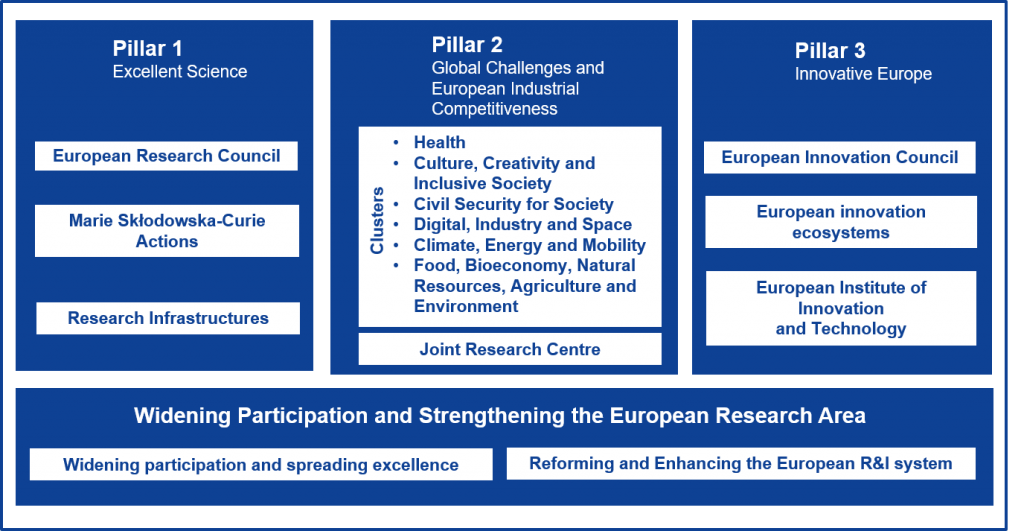European Innovation Agencies Make Plans to Strengthen Innovation
The European Innovation Council (EIC) and the European Institute of Innovation and Technology (EIT) have signed a letter of intent to coordinate efforts and strengthen Europe’s innovation services, pledging to build a “more integrated and inclusive EU innovation ecosystem for the benefit of EU innovators.”
Potential areas of cooperation are currently being tested in three €1 million pilot projects. The innovation agencies will finalise their collaboration in Spring 2021, before rolling it out in 2022.
Context
The EIC and EIT are complementary organisations, working towards the shared goal of translating Europe’s research strengths into jobs and growth. However, they operate in different ways:
- The EIT focuses on the integration of higher education, research, and innovation to address global challenges set in Horizon Europe. It has eight designated Knowledge and Innovation Communities, each of which addresses a specific societal challenge.
- In contrast, the EIC provides financial support for innovators. Its focus is on all areas of disruptive and breakthrough market-creating innovation.
A closer working relationship between the two institutions will enable companies from underperforming countries to secure more funding. As a result, this will help narrow the innovation gap between east and west Europe.
Significance
EU research commissioner, Mariya Gabriel, has labeled the move “a stepping stone in creating the European Innovation Area.” It marks a recognition that European innovation is vital. Innovative ideas key to tackling major societal challenges, including Covid-19 and climate change. They can also help Europe regain its position as a world leader in the field of innovation.
Please note: Negotiations are still ongoing to determine the UK's participation in Horizon Europe, the EU's next funding programme for research and innovation. However, UK scientists, researchers, and businesses can still apply for funding from the European Green Deal, the last and biggest call under Horizon 2020. You can read more about this competition here.
Source: Science|Business
European Green Deal: €1 billion available for innovative projects
One of the European Commission’s top priorities is to tackle climate change and make Europe climate-neutral by 2050. As a result, the Commission has launched a €1 billion call for research and innovation projects that respond to the climate crisis. Funded by Horizon 2020, the European Green Deal Call aims to drive Europe’s recovery from the coronavirus crisis by turning green challenges into innovation opportunities.
Due to the urgency of the challenges it addresses, the Green Deal Call aims for clear, discernible results in the short to medium-term, but with a perspective of long-term change. Therefore, there are fewer, but more targeted, larger and visible actions. The focus is on rapid scalability, dissemination, and uptake.
Scope
The projects funded under this call must deliver results with tangible benefits in ten areas. Firstly, there are eight thematic areas reflecting the key work streams of the European Green Deal:
- Increasing climate ambition
- Clean, affordable and secure energy
- Industry for a clean and circular economy
- Energy and resource efficient buildings
- Sustainable and smart mobility
- Farm to fork
- Biodiversity and ecosystems
- Zero-pollution, toxic-free environments
Secondly, there are two horizontal areas: strengthening knowledge and empowering citizens. They offer a longer-term perspective in achieving the transformations set out in the European Green Deal.
Furthermore, we are pleased to confirm that UK scientists, researchers, and businesses are eligible to apply for this funding. UKRI has confirmed that projects will receive funding for the lifetime of Green Deal projects, even if they continue beyond 31st December 2020 (when the UK’s period of transition out of the EU ends).
The closing date for applications is 26th January 2021, with selected projects expected to start in autumn 2021. For our assistance in putting together a competitive proposal, contact us today.
£2m available for projects on healthy ageing
Last month, Eureka made an exciting multilateral call for projects on healthy ageing. UK registered businesses are invited to apply for a total grant of up to £500,000, to develop digital health technologies in partnership with organisations from Eureka countries. Innovate UK have allocated up to £2 million to fund innovation projects in this competition.
Projects must meet one of more of the following themes: robotics, augmented or artificial intelligence, software as a medical device, wearables, medical devices, diagnostics, imaging, data analytics, sensors, and apps. Your project must focus on industrial research but can include experimental development activities if Innovate UK deem it appropriate – you can read their general guidance here.
The competition closes on 5th August 2020. More information can be found on the Innovate UK web page. If you think that you might be eligible for this fund, please contact us to organise a free consultation.
Japan GlobalStars call for joint project proposals
 Within Eureka’s GlobalStars initiative, Japan, Canada, Czech Republic, France, Germany, Israel, Spain, and the UK are launching a common call for submissions from Japan and respective Eureka member countries. Eureka GlobalStars invites participants to submit joint project proposals in the research and development of innovative products and applications with a strong market potential.
Within Eureka’s GlobalStars initiative, Japan, Canada, Czech Republic, France, Germany, Israel, Spain, and the UK are launching a common call for submissions from Japan and respective Eureka member countries. Eureka GlobalStars invites participants to submit joint project proposals in the research and development of innovative products and applications with a strong market potential.
This is an open call for proposals. It invites projects from any sector area, except for nuclear technologies and pharmaceutical technologies. The project must involve at least one company from Japan, and one from a respective Eureka member country.
To be eligible for Innovate UK support, a UK applicant must:
- be a UK based business, of any size;
- collaborate with the Japanese lead partner;
- involve at least one UK based SME, unless the lead themselves is an SME;
- the UK SME in your consortium must incur at least half of the UK total eligible project costs. If your consortium contains more than one UK SME, this minimum is shared between them.
The call opens on Monday 8th June and the deadline for Eureka application is set at 10th September 2020. For more information about this opportunity, please click here. Alternatively, to discuss your project with one of our specialists, contact us today.
To stay updated on grant funding opportunities, sign up to our free monthly newsletter, and receive expert insights direct to your inbox.
Horizon Europe: New Horizons for European Funding
2020 marks the end of Horizon 2020, the EU’s biggest ever EU Research and Innovation programme, which has provided nearly €80 billion of funding over 7 years (2014-2020). Succeeding Horizon 2020, Horizon Europe will run from 2021 to 2027 to ensure that Europe remains a world-class leader in Research and Innovation. The European Commission will invest €100 billion into Research and Innovation that will shape the future of Europe, making it the most ambitious programme of its kind.
“With Horizon Europe, we want to build on this success and continue to make a real difference in the lives of citizens and society as a whole.”
-European Commission Vice-President Jyrki Katainen, responsible for Jobs, Growth, Investment and Competitiveness.
Preliminary Structure of Horizon Europe

Like Horizon 2020, the programme will have three pillars. The first will fund excellence in science, supporting frontier research projects designed by researchers through the European Research Council. The second pillar focuses on Global Challenges and European Industrial Competitiveness. It will support research into societal challenges and reinforce technological and industrial capacities. It also sets ambitious EU-wide missions to tackle some of Europe’s biggest problems, including health and climate change. Thirdly, the Innovative Europe pillar aims to increase Europe’s prowess in market-creating innovation and SME growth through the European Innovation Council.
Following the Horizon 2020 Interim Evaluation, the European Commission has implemented several changes to support Research and Innovation across Europe. For example, they will support breakthrough, high-risk innovation through the creation of the European Innovation Council. This will help innovators to create new market opportunities. Additionally, through the launch of new missions with bold, ambitious goals, Horizon Europe will create more impact across Europe. An open science policy will enable better science through collaborative ways of producing and sharing knowledge and data. Further, an emphasis on widening participation will help low Research and Innovation performing Member States to participate in Horizon Europe.
Despite the uncertainty caused by Brexit, we are hopeful that the UK will remain a part of the Horizon Europe research programme. If you'd like to discuss European funding with one of our specialist advisers, please do not hesitate to contact us today.
To stay updated on the grant funding landscape, sign up to our free monthly newsletter, and receive expert insights direct to your inbox.
Increase in funding for game-changing green innovation and woman-led companies…
A significant increase to the European Innovation Council (EIC) Pilot budget is expected to be adopted by the European Commission in March 2020, to support game-changing, market-creating innovation and deep-tech SMEs to scale-up, paving the ground for the launch of a ‘fully-fledged’ programme in Horizon Europe (2021 – 2027).
A one-off EIC Accelerator call for ‘green deal’ start-ups and SMEs is expected, whereby all applicants submitting for the 19th May 2020 cut-off will need to demonstrate how their innovation contributes to the goals of The European Green Deal. The 7th October 2020 cut-off for the EIC Accelerator Pilot will remain open to all innovations.
Additional opportunities for companies with women CEOs (or equivalent positions) is also expected, to ensure 25% of all finalists in the EIC Accelerator Pilot are women-led companies. If, following the first-round remote evaluation, a minimum of 25% of companies selected for the final-stage interviews are not led by women, additional interviews will be scheduled.
An advanced version of the amended EIC Work Programme is due to be released by the end of February, and the final version by the end of March, replacing plans for the year ahead in the current EIC Pilot Work Programme 2018 - 2020.
Important EIC Accelerator update for UK applicants...
The Withdrawal Agreement means that the UK can continue to participate in EU programmes, including Horizon 2020, that are financed by the 2014-2020 Multiannual Financial Framework (MFF) until their closure (i.e. for the lifetime of grants). UK participants will continue to receive EU grant funding for the lifetime of individual Horizon 2020 projects, including projects finishing after the transition period ends at the end of 2020.
UK scientists, researchers and businesses can continue to participate in and lead Horizon 2020 projects and apply for Horizon 2020 grant funding. The vast majority of Horizon 2020 projects will be able to continue as before during the transition period and beyond. This includes ERC, MSCA, and the EIC Accelerator. However, for the latter, UK entities are now only eligible for the grant element of the programme, meaning they cannot apply for equity support.
A very limited number of UK Horizon 2020 projects, which involve access to security-related sensitive information restricted for EU Member States, may be unable to continue after EU Exit in their current form. The government expects the European Commission to inform participants if this is the case.
